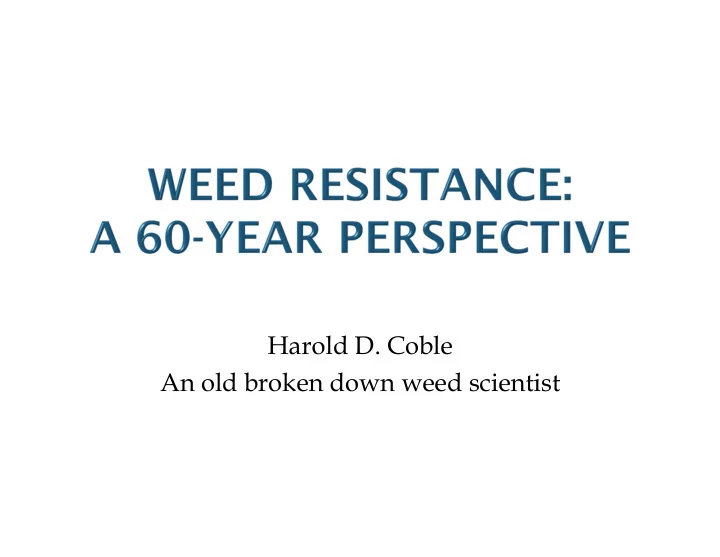

Harold D. Coble An old broken down weed scientist
Herbicide-resistant weeds: a game-changer for agriculture Particular concern about resistance to multiple classes of chemistry and metabolic resistance We have become complacent in our approach to weed management We must become better managers And, we will continue to need new technology
Main Focus has been on killing weeds (Control) Weed control is chemically based - technology Good reason for that Efficiency, economics, etc. Nothing else comes close for weed control People left the farm in mass – farming was a hard life Hand weeding is drudgery Includes plowing with a mule Life is simpler when you plow around the stumps
New chemical technologies allowed: More acres per grower Less time and labor involved in weed control Economic incentives Simplification of weed control Much improved weed control
Mostly about genetic engineering One chemical controls all weeds (mostly) Most of industry “gave up” on new chemistry 1975 – 30 companies involved in development 1999 – 6 companies remain
Popular to blame the technology
Popular to blame the technology It is NOT the fault of the technology Overreliance on ANY technology is risky Maybe the technology was too good? Humans are inclined to look for simple solutions The Pogo analogy “We have met the enemy and he is us” The “Tragedy of the Commons” Use of common pool resources
Need more focus on weed management Weed management is multi-strategy Prevention Avoidance Monitoring Suppression Utilization of BMPs Still need new technology Not just chemicals
Assume all fields have resistance Resistance genes are present May not have manifested in a weed yet May not have been selected for yet But it will happen without proper management Cannot manage something you do not have – But, you can manage to not have it!!!
High cost of human capital May take more of grower’s time
High cost of human capital May take more of grower’s time Short-term farming High percentage of farmland rented Short-term leases Concentration on farming “a year at a time”
High cost of human capital May take more of grower’s time Short-term farming High percentage of farmland rented Short-term leases Concentration on farming “a year at a time” Near term costs for longer term gains
High cost of human capital May take more of grower’s time Short-term farming High percentage of farmland rented Short-term leases Concentration on farming “a year at a time” Near term costs for longer term gains Resistance is an area wide issue Neighbor effect
Government incentives Conservation programs? Crop insurance rebates? Regulation?
Government incentives Conservation programs? Crop insurance rebates? Regulation? Market incentives Tie land prices to occurrence of resistant weeds? Promote longer-term rental leases to management?
Government incentives Conservation programs? Crop insurance rebates? Regulation? Market incentives Tie land prices to occurrence of resistant weeds? Promote longer-term rental leases to management? Industry incentives Tie rebate programs to BMP use?
Probably not – it was in the populations – we just selected for it.
Absolutely – by paying more attention to what was happening post treatment and following up to clean up escapes
It depends…
If we do not get smarter…..
Learn from past mistakes Cannot do same thing all the time in all fields Increase diversity of weed management tactics More critical observation of tactic outcomes All segments tell the same story Transparent product information Understand there is no “silver bullet” Translate impacts into $$$$$
Recommend
More recommend